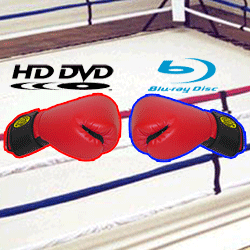HD-DVD vs Blu-Ray
 First it was the round wheel versus the square wheel. Then VHS versus Betamax. Then it was DVD-R versus DVD-R. Well, hang onto your hats, boys and girls, because here we go again with yet another battle between competing formats. Here is a great High Definition DVD FAQ.
First it was the round wheel versus the square wheel. Then VHS versus Betamax. Then it was DVD-R versus DVD-R. Well, hang onto your hats, boys and girls, because here we go again with yet another battle between competing formats. Here is a great High Definition DVD FAQ.This time, it is HD-DVD (also known as AOD, or Advanced Optical Disc) versus the opposing Blu-Ray format. Needless to say, the formats are not compatible, and millions of dollars have already been spent developing both formats, so neither camp wants to admit defeat and switch sides now.
Sony's Playstation 3 will feature Blu-Ray technology, but Microsoft has officially sided with HD-DVD, and should be including support in the next version of Windows, which, of course, offers an incredible advantage to the HD-DVD format, since pretty much everybody except the stray Mac or Linux user will have it right on their desktops.
Blu-Ray offers slightly larger storage capacity, but is completely incompatible with current DVD technology. HD-DVD (which will likely be called "AOD"), on the other hand, offers 15 to 30 GB capacity (already 3x larger than current DVDs), and is backwards-compatible with current DVD technology, which means that not only will the manufacturers be able to upgrade their assembly lines with relative ease, but we the consumers will be able to continue to use our current DVD collection and equipment for years to come. In other words, they're cheaper to make, and therefore cheaper for the consumers to buy. This is a HUGE advantage in favor of HD-DVD, and is likely going to be the primary reason that HD-DVD will win this particular battle.
There is a practical use, however, for Blu-Ray technology, however, if only Sony would use their heads about the whole thing. By not developing end-user drives for Blu-Ray, they will be able to effectively stop copying without a lot of legal hassles. They won't need to rely on the DMCA to prevent copying if the end users simply cannot read the discs on their home computers. Granted, this only applies to the PS3, but there is no readon why they couldn't license the technology to Microsoft and Nintendo for their respective game consoles.
This would solve a world of problems, and the users would have the best of both worlds. We'd get the benefit of backwards-compatible discs for our movie collections, and the game manufacturers would have an effective means of not only preventing copying, but making use of that additional storage capacity to create larger and more impressive cinematics in their game titles. It's a win-win idea. (If only somebody would listen to Angry Internet Guy for a change...)
Angry Internet Guy says, "Can't we all just get along?"
















